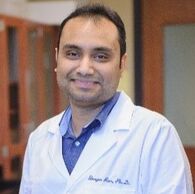
Dr. Rao is an Associate Professor in the Department of Chemical and Biological Engineering at The University of Alabama. His interdisciplinary research program focuses on utilizing engineering tools to unravel the mechanisms associated with the role of microenvironment in cancer progression, therapeutic response, and resistance with a particular focus on primary and secondary brain cancers. His lab is currently funded by grants from the National Science Foundation, METAvivor, and the American Cancer Society (http://raolab.ua.edu/).
Representative Publications
- The impact of astrocytes and endothelial cells on glioblastoma stemness marker expression in multicellular spheroids. P.S. Nakod, Y. Kim, S.S. Rao. Cell. Mol. Bioeng., 2021.
- Matrix stiffness and cluster size collectively regulate dormancy versus proliferation in brain metastatic breast cancer cell clusters. R. Kondapaneni, S. S. Rao. Biomater. Sci. 8(23):6637-6646, 2020.
- Three-dimensional biomimetic hyaluronic acid hydrogels to investigate glioblastoma stem cell behaviors. P.S. Nakod, Y. Kim, S.S. Rao. Biotechnol. Bioeng., 117(2): 511-522, 2020.
- An in vitro hyaluronic acid hydrogel based platform to model dormancy in brain metastatic breast cancer cells. A. A. Narkhede$, J. H. Crenshaw$, D. K. Crossman, L. A. Shevde, S.S. Rao. Acta. Biomater., 107: 65-77, 2020. ($ denotes equal contribution).
- Role of surface chemistry in mediating the uptake of ultrasmall iron oxide nanoparticles by cancer cells. A. A. Narkhede$, J. A. Sherwood$, A. Antone, K. R. Coogan, M. S. Bolding, S. Deb, Y. Bao, S.S. Rao. ACS. Appl. Mater. Interfaces., 11(19): 17157-17166, 2019. ($ denotes equal contribution)
Research Interests
The Rao lab’s research interests lie at the interface of engineering, cancer biology, and medicine. The research in the Rao Lab has focused on developing biomimetic model systems to unravel the mechanisms associated with the role of microenvironment in cancer progression, drug response and resistance. Using engineered biomimetic scaffolds, the lab specifically studies several aspects of the tumor microenvironment and how these aspects control cancer cell phenotypes in primary and secondary brain cancers. Understanding these mechanisms is critical to the development of new therapeutic strategies.

